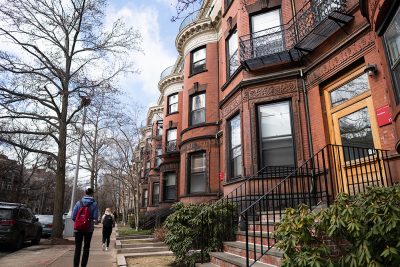
Boston University raised student housing costs for the 2020-2021 academic year. While confirmed rates will be sent in a letter by President Robert Brown along with tuition prices, estimated rates are posted on BU’s housing website.
BU’s housing rate increase applies to all on-campus residences, affecting both traditional and non-traditional residence types. Colin Riley, a spokesperson for BU, said the new rates reflect a “modest increase” of roughly three percent.
The cost for a quad, triple or double room, including a dining plan, will increase by $480, equating to a total price of $16,640 for the university’s standard minimum housing rate. The cost for an apartment style residence with two or more students will increase $440 to a price of $14,510 excluding a dining plan.
“Typically [the rate increase] is an annual increase,” Riley said. “The university works very hard to minimize these increases as a percentage. But they are, and have for the past 20 to 25 years been, below the national average for similar universities.”
Increases of this nature have been seen before. BU increased its on-campus living rates by 3.5 percent for the 2015-2016 academic year, as reported in 2015. The year prior, BU increased the prices of on-campus residences on average by $561 and dining plans by an average of $140, as reported in 2014.
The rise of university housing costs reflects the rate of inflation reported by Commonfund Institute’s 2019 Higher Education Price Index, Riley said. According to HEPI, inflation for colleges and universities was 2.5 percent for the 2019 fiscal year.
Riley said he does not believe the increased housing rates will result in an increase of BU students pursuing off-campus residence options.
“That is a separate issue. The quality and the variety and the benefit of living in university housing is what keeps students and attracts students to on-campus housing,” Riley said. “Having 24-hour on-call maintenance service, quality dining, the options and ability to live in an apartment style to prepare and cook your own meals, being in the core campus and being close to classes, libraries and Fit-Rec all have benefits.”
BU students who pursue off-campus housing options typically turn to BU’s surrounding neighborhoods, such as Brighton and Allston, which make up the city’s ninth district.
Liz Breadon, city councilor for District 9, said she believes high on-campus housing costs will motivate students to pursue off-campus residence options.
“If BU and the other universities charge too much for their on campus housing, then that will drive more students off campus,” Breadon said. “It is an economic issue. They can save thousands of dollars a year by living off-campus. Having realistic and affordable costs associated with campus housing would be important.”
The Brighton-Allston district is in close proximity to Boston College and Harvard University, as well as BU. Having three major universities near District 9 severely impacts the neighborhoods and is an on-going concern, Breadon said.
“[The university presence] greatly impacts us and adds a lot of extra residents to our neighborhood that increases demand and drives increases in rent across the district,” Breadon said. “For BU specifically, I would like them to house more of their students and to look at making it more economically feasible for students to live on-campus.”
Riley said the university acknowledges that there could be negative financial effects and concerns for BU students and their families as a result of the rate increase.
“We certainly understand the increase is factored in. The university is generous with its institutional financial assistance, even more so now with the incoming class,” Riley said. “Going forward, [housing costs] is something that the university is cognizant of and working to address.”
Although she will graduate this May, Jie Yu, a senior in the College of Arts and Sciences, said she is concerned for students next year.
“I don’t think the price will have an influence on me, but it will for future students,” Yu said. “I hope BU can increase the price a little more slowly, so more students still want to live on-campus.”
Caroline Banfi, a sophomore in CAS, said she thinks that if the price increase is due to inflation, then the new housing rates are warranted, but wants more transparency from the university.
“If they’re increasing housing [costs], they should let students know exactly why they’re increasing it because a lot of people complain,” Banfi said. “They don’t know exactly why it’s increased or why things are changing.”
Mayzie Sattler, a junior in CAS, said she prefers living off-campus to keep her work and home life separate, but also cites high housing rates as a reason for abstaining from university housing.
“It’s less expensive for us to be in Allston,” Sattler said. “And it’s a lot easier to separate our lifestyle with school. It’s like going to work.”
















































































































